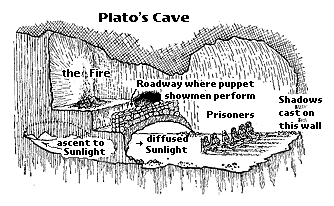Churchland evaluates dualism in Matter and Consciousness. In evaluating dualism, he finds several key problems. Dualism is the theory that two things exist in the world: the mind and the physical world. This means that humans are made of two things, the mind and the body. Firstly, there are a lot of blanks and unknown answers when contemplating dualism. Mainly, it cannot be known how the mind and body are linked together to form a being. The dualist cannot tell us anything about the mind, other than that it exists and works in conjunction with the body in some way. The dualist argues the mind encompasses reason, emotion, and consciousness. However, machines, which certainly do not have minds, have already demonstrated reasoning, such as a calculator. Emotions have been linked with brain chemicals, which would be physical entities. And consciousness can be affected by physical things like “anesthetics… caffeine, and… something as simple as a sharp blow to the head” (20). Reason, emotion, and consciousness make perfect sense when linked with the physical brain, but not much sense when attributed to the unknown workings of the non-physical mind.
In Eliminative Materialism and the Propositional Attitudes, Churchland argues for eliminative materialism. This claims that folk psychology has been incorrect all along, and that we need to start thinking with a new paradigm of what we believe to be common sense in order to figure out the world really works. In addition, it asserts that the only thing that exists in the world is the physical realm, and that the mind is not separate from the body. There is a video that summarizes this writing: https://www.youtube.com/watch?v=SAybGdBg-T4
Folk psychology cannot even explain some of the simplest phenomena. For example, memory, catching balls, and hitting moving targets with snowballs are all things that still are widely not understood. And “the nature and psychological functions of sleep, that curious state in which a third of one’s life is spent” (596) have many puzzles that have yet to be solved. This suggests that perhaps a new way of thinking is needed for people to understand the world around them.
I agree with Churchland’s view of materialism as opposed to dualism. In dualism, it can even sometimes be hard to distinguish between body and mind. In materialism, it is very straightforward, as everything is physical. In addition, it is indisputable that the brain affects one’s decisions, emotions, and conscious thought. This makes it so that everything can be attributed to the brain and neurotransmitters and other chemicals, rather than assigning them to a separate unknown state (the mind). In addition, evolution is based on physical processes, and it makes a lot more sense evolutionary for physicality to be the only entity. The video points out that “all life on earth evolved from purely physical materials by means of purely physical processes”, so it wouldn’t add up if there were also the non-physical mind. In addition, if the mind did exist, it would be very connected with the brain and its processes, and the two would be almost indistinguishable without regards. But if this is the case, there wouldn’t be much point to having a mind at all.
